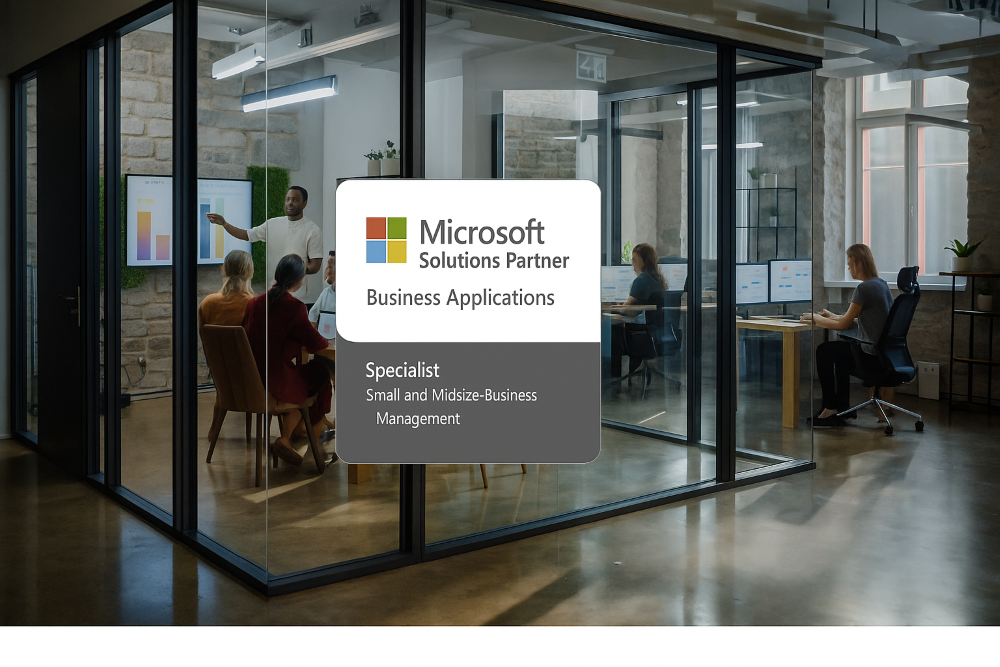.webp?1765466560645&width=1100&height=820&name=tmg-computer%20(1).webp)
Dynamics is our Sweet Spot
The TM Group offers more than just implementation expertise—we help assess whether a specific business solution aligns with your unique needs. Selecting the right ERP implementation partner is as crucial as choosing the software itself.
.webp?1765466560645&width=1000&height=820&name=tmg-team%20(1).webp)
Our Story
Since 1984, our focus has always been on providing expert guidance to ensure the success of our clients. Specializing in Microsoft Dynamics ERP and CRM solutions, we have completed more than 1,000 successful implementations and received numerous Microsoft and industry awards. We’re proud to be recognized as a leading Dynamics partner nationwide.
We serve
"I cannot imagine working with any other partner! Your team has been absolutely fabulous to work with and I could not have asked for more."
IT Manager at a Family Office"I cannot imagine working with any other partner! Your team has been absolutely fabulous to work with and I could not have asked for more."
CFO at a Service Firm"I cannot imagine working with any other partner! Your team has been absolutely fabulous to work with and I could not have asked for more."
Controller at a Hospitality Company"I cannot imagine working with any other partner! Your team has been absolutely fabulous to work with and I could not have asked for more."
IT Manager at a Family OfficeNews & Events
The TM Group Earns Microsoft’s Small and Midsize Business Management Specialization
The TM Group earned Microsoft’s Small and Midsize Business Management specialization, showcasing our expertise in modernizing SMB operations with Dynamics 365 Business Central and Microsoft Cloud solutions.
Microsoft Dynamics GP to Business Central: Lunch & Learn Events in Grand Rapids, Edwardsburg, and Mount Pleasant
Microsoft is phasing out Dynamics GP. Join TMG’s Michigan & Indiana Lunch & Learns to explore Business Central and plan your transition.
The TM Group Named to Accounting Today’s 2025 VAR 100 List
The TM Group secures a spot on Accounting Today's 2025 VAR 100 list, highlighting their excellence in ERP solutions and client relationships.
Microsoft Business Central "Accelerate" Partner of the Year
Microsoft Business Central “Accelerate” Partner of the Year by Stratos; exceptional service, expertise, and commitment to delivering impactful solutions.
Smarter Business Now: Introducing the Theme of Our 2025 Vision Conference
Discover how to transform your business with cutting-edge Microsoft technologies at the Vision 2025 Conference. Join us to explore smarter, data-driven solutions for growth and productivity.
Join Us for a Northern Michigan Brunch & Learn: The Future of Dynamics GP
Join us in Northern Michigan for a Brunch & Learn on the future of Dynamics GP and explore transitioning to Dynamics 365 Business Central. RSVP by November 1, 2024.
Transformative Partnership: Tangicloud & TMG Enhancing NFP Financial Management
Tangicloud and TMG partner to enhance financial management for nonprofits, government entities, and Community Mental Health organizations with advanced tools and expert support.
Elevating Family Office Solutions: New Partnership Between The TM Group and Elysys
Partnership between The TM Group and Elysys enhances financial solutions for family offices, offering expert consulting, custom solutions, and ongoing support with Microsoft Dynamics 365 Business Central.
For The 20th Consecutive Year, TMG On Both VAR 100 and Top 100 VARs Lists
TMG celebrates 20 years of excellence, earning spots on the 2024 VAR 100 and Top 100 VARs lists for outstanding ERP solutions and customer service.
The TM Group Recognized for the 14th Year in Bob Scott’s VAR Star for Outstanding Performance in ERP Solutions
The TM Group is honored as a top Value-Added Reseller for the 14th consecutive year by Bob Scott’s VAR Stars, showcasing its excellence in ERP solutions.


.webp?1765466560645&width=1100&height=820&name=transition-system-tmg%20(1).webp)
.webp?1765466560645&width=1100&height=820&name=cmh-colors1%20(1).webp)
.webp?1765466560645&width=1100&height=820&name=distrub%20(1).webp)
.webp?1765466560645&width=1100&height=820&name=tmg-famoff%20(1).webp)
.webp?1765466560645&width=1100&height=820&name=TMG-plastics1%20(1).webp)


.jpg)






